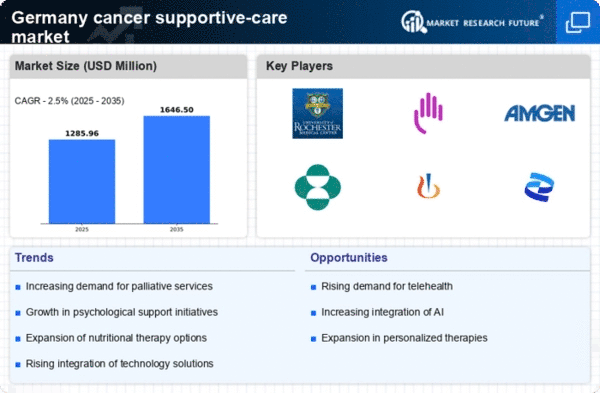Increasing Cancer Incidence
The rising incidence of cancer in Germany is a primary driver for the cancer supportive-care market. According to the Robert Koch Institute, cancer cases are projected to increase by approximately 10% over the next decade. This trend necessitates enhanced supportive care services to manage symptoms and improve the quality of life for patients. As the population ages, the demand for comprehensive care solutions, including pain management and psychological support, is likely to grow. The cancer supportive-care market is thus positioned to expand significantly, as healthcare providers seek to address the complex needs of an increasing patient population. This growth is further supported by government initiatives aimed at improving cancer care, which may lead to increased funding and resources allocated to supportive services.
Advancements in Treatment Modalities
Innovations in cancer treatment modalities, such as immunotherapy and targeted therapies, are influencing the cancer supportive-care market. These advanced treatments often come with complex side effects that require specialized supportive care. For instance, patients undergoing immunotherapy may experience unique challenges, necessitating tailored supportive interventions. The market is expected to adapt to these advancements by offering services that address the specific needs arising from new treatment regimens. As treatment options evolve, the demand for supportive care that can effectively manage side effects and enhance patient well-being is likely to increase. This dynamic creates opportunities for healthcare providers to develop comprehensive care plans that integrate supportive services with cutting-edge treatments.
Growing Awareness of Palliative Care
There is a growing awareness of the importance of palliative care in the cancer supportive-care market. In Germany, healthcare professionals and patients alike are increasingly recognizing that supportive care is essential not only for end-of-life scenarios but also throughout the cancer treatment journey. This shift in perception is likely to drive demand for palliative services, which focus on alleviating suffering and improving quality of life. As a result, healthcare systems may allocate more resources to develop palliative care programs, thereby enhancing the overall supportive care landscape. The integration of palliative care into standard treatment protocols could lead to improved patient outcomes and satisfaction, further propelling the growth of the cancer supportive-care market.
Regulatory Support and Funding Initiatives
Regulatory support and funding initiatives from the German government are playing a crucial role in shaping the cancer supportive-care market. Recent policies aimed at enhancing cancer care have led to increased financial resources for supportive services. For example, the introduction of reimbursement models for palliative care has made it more accessible to patients. This financial backing encourages healthcare providers to expand their supportive care offerings, ensuring that patients receive comprehensive care throughout their treatment journey. As funding continues to grow, the cancer supportive-care market is likely to see an influx of innovative services designed to meet the diverse needs of patients, ultimately improving their quality of life.
Integration of Multidisciplinary Care Teams
The integration of multidisciplinary care teams is emerging as a vital driver in the cancer supportive-care market. In Germany, healthcare providers are increasingly adopting collaborative approaches that involve oncologists, nurses, social workers, and other specialists working together to address the holistic needs of cancer patients. This model not only enhances communication among care providers but also ensures that patients receive comprehensive support tailored to their individual circumstances. The effectiveness of multidisciplinary teams in managing complex cancer cases is likely to lead to improved patient outcomes and satisfaction. As this approach gains traction, the cancer supportive-care market may experience growth as healthcare systems invest in training and resources to support these collaborative efforts.
















